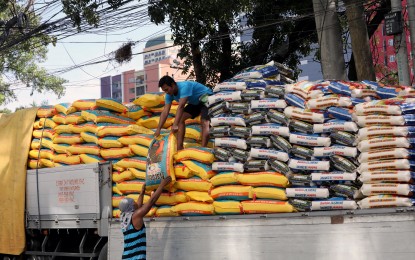
RICE PRICES. Workers unload sacks of rice at a warehouse in Tondo, Manila in this undated photo. Finance Secretary Ralph Recto has proposed the further reduction of rice import tariff to further lower rice prices. (PNA photo by Yancy Lim)
MANILA – Department of Finance (DOF) Secretary Ralph Recto has proposed the temporary reduction of rice import tariffs to help bring down prices.
In an interview with reporters at the sidelines of the Philippine Economic Briefing in Pasay City on Monday, Recto said that while world rice prices are already going down, further reducing rice import tariffs from the current 35 percent will help bring down rice prices in the market.
"World prices are going down and we can reduce tariffs as well," he said.
Executive Order (EO) 50 issued by President Ferdinand R. Marcos Jr. last year extended the reduced tariff rates of key agricultural commodities, including rice.
"I think mag-hearing pa ang Tariff Commission tungkol dyan [lower rice tariffs] soon. (I think the Tariff Commission will have a hearing about that [lower rice tariffs] soon)," Recto said.
"You have to strike a balance between the farmers and the consumers. Mas maganda yung hating kapatid, 17.5 [percent] (Better if it's equally divided, 17.5 [percent]). Could be 20 percent, right?," he added.
Recto, however, clarified that he is leaving it to the discretion of the Secretary of Agriculture.
"I leave that to the Secretary of Agriculture. First to discuss with his constituencies. Kailangan may hearing yan, eh (There should be a hearing). But there are about 3 million farmers and 115 million consumers, or 112 million, so a good balance should be [there]," he said.
The tariff adjustment should be made while Congress is on recess so the President can issue an EO.
"We want it lower, right? As much as possible, not only up to the end of the year. But possible, the EO will be only up to the end of the year. And then, let's take a look, and then, if we need to extend it, then we can extend it, right? But what's important is to reduce the prices of rice. That's what our countrymen want," Recto said.
House Speaker Ferdinand Martin G. Romualdez lauded Recto for honoring their agreement to reduce rice tariffs to bring down the price of rice to below PHP50 per kilo.
Romualdez said he met Recto, Department of Agriculture Secretary Francisco Tiu Laurel Jr., Customs Commissioner Bienvenido Rubio, and House Appropriations Committee Chair Zaldy Co of Ako Bicol Party-list to craft practical solutions to mitigate the financial strain on consumers while securing fair compensation for local rice farmers.
He said the agreement is expected to help make rice more affordable without undermining local farmers' livelihood.
Despite the planned tariff reduction, Romualdez said farmers will continue to receive support from the Rice Competitiveness Enhancement Fund (RCEF), funded by taxes collected under Republic Act 11203 or Rice Tariffication Law.
As of April, DOF data indicate that rice tariff collection has already reached PHP16 billion – enough to cover the PHP10-billion minimum requirement to assist farmers under RCEF.
Romualdez also called for stricter price controls in the retail market to prevent price manipulation and protect consumers.
He also supported Laurel’s suggestion to bring low-priced fresh fish, chicken and other agricultural produce to the market, particularly at the Kadiwa centers.
“Our goal is to lower food prices while protecting local farmers and producers. We hope to do this by increasing local procurement and adjusting import tariffs,” he added.
Romualdez said this requires the cooperation of relevant government agencies, market players and local producers.
“DA should talk to traders to avoid hoarding and price manipulation,” he said.
He added the House of Representatives is fully committed to supporting President Ferdinand R. Marcos Jr.’s goal of significantly reducing rice prices.
The commitment includes addressing market challenges through collaborative efforts and strategic interventions, ensuring that every Filipino has access to quality but affordable rice. (with a report from Zaldy De Layola/PNA)
 The Philippine News Agency is a web-based newswire service of the Philippine government under the supervision of the News and Information Bureau (NIB) of the Presidential Communications Office (PCO).
The Philippine News Agency is a web-based newswire service of the Philippine government under the supervision of the News and Information Bureau (NIB) of the Presidential Communications Office (PCO).